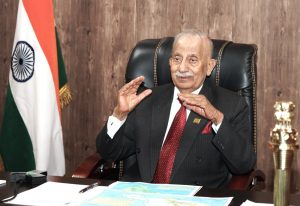Hon’ble Lt Governor Brig (Dr) BD Mishra (Retd) chairs 12th meeting of State Board for Wildlife of UT Ladakh.

Hon’ble Lt Governor Brig (Dr) BD Mishra (Retd) chairs 12th meeting of State Board for Wildlife of UT Ladakh.
Report for rationalisation of Karakoram (Nubra-Shayok) Wildlife Sanctuary & High-Altitude Cold Desert (Changthang) Wildlife Sanctuary submitted by Wildlife Institute of India approved in meeting
Leh, June 30, 2025: The 12th meeting of the State Board for Wildlife of UT Ladakh was held at the Lieutenant Governor’s Secretariat under the chairmanship of the Hon’ble Lieutenant Governor of Ladakh, Brigadier (Dr) BD Mishra (Retd). The agenda of the meeting centred on the report presented by the Wildlife Institute of India (WII) to the Hon’ble members of the State Board for Wildlife regarding the rationalisation of the Karakoram (Nubra-Shayok) Wildlife Sanctuary and the High-Altitude Cold Desert (Changthang) Wildlife Sanctuary for their approval.
At the outset, the Chief Secretary of UT Ladakh, Dr. Pawan Kotwal, IAS, briefed the members about the extensive rationalisation exercise undertaken by the Wildlife Institute of India (WII), Dehradun, in close coordination with the Department of Wildlife, UT Ladakh, for delineating high-conservation value areas from low-conservation value areas within the Karakoram and Changthang Wildlife Sanctuaries to enhance wildlife protection while accommodating the needs of local inhabitants. He also informed that the final map prepared by WII, Dehradun, has been endorsed by all key stakeholders, including the Hill Councils and residents of these wildlife sanctuary areas.
Bilal Habib from Wildlife Institute of India (WII) Dehradun, in his PowerPoint Presentation on rationalisation of wildlife protected areas in UT Ladakh, informed the members about the alignment of the approach, justification for rationalisation, viz. co-existence of habitations and the need for development, co-existence of the people with wildlife, the need to meet basic requirements of both people and wildlife, the need to protect high-conservation value areas, etc; rationalisation framework/the idea of rationalisation based on species diversity, landscape-level ecosystems and mosaics, ecosystems and habitats, ecosystem services, community needs and cultural values, etc. He further informed the members that following the completion of the rationalisation exercise, the revised net areas of the wildlife sanctuaries stand at 16,550 sq km for Karakoram Wildlife Sanctuary and 9,695 sq km for Changthang Wildlife Sanctuary, respectively.
The board members raised queries and concerns, including the need for conservation of wetlands for migratory birds, the adherence of the ruling of the Hon’ble High Court of J&K and Ladakh in 2018, the need to reach on a consensus for the finalisation of rationalisation of boundaries of Wildlife Sanctuaries in wake of the issues faced by the inhabitants of the areas and keeping future development activities in the newly announced districts of Nubra and Changthang in mind, etc.
After listening to the suggestions and concerns of the members, the HLG approved the rationalised maps/report of both Karakoram and Changthang Wildlife Sanctuaries as submitted by WII, Dehradun and directed the Chief Secretary, UT Ladakh, to compile all issues, concerns, and suggestions raised by the Board members so that necessary measures can be taken to safeguard the interests of both inhabitants and wildlife without altering the rationalised boundaries proposed by WII.
Chairman/CEC, LAHDC Leh, Adv Tashi Gyalson; Chairman/CEC, LAHDC Kargil, Mohd Jaffer Akhoon; Chief Secretary, Dr Pawan Kotwal, IAS; Executive Councillor, LAHDC Leh, Tashi Namgyal Yakzee; DGP Ladakh Police, Dr SD Singh Jamwal, IPS; Chief Wildlife Warden, UT Ladakh, Sajjad Hussain Mufti, IFoS; officials from Wildlife Institute of India (WII), Dehradun; representatives from Zoological Survey of India/Botanical Survey of India; wildlife experts- Dr MK Ranjitsinh, Dr RK Singh; Mandeep Mittal (IFoS); former PCCF Ladakh, Jigmet Takpa (IFoS Retd); Director, Snow Leopard Conservancy India Trust, Dr Tsewang Namgail; Assistant Prof, UoL, Dr Mohd Hussain and other officials attended the meeting physically and virtually.


